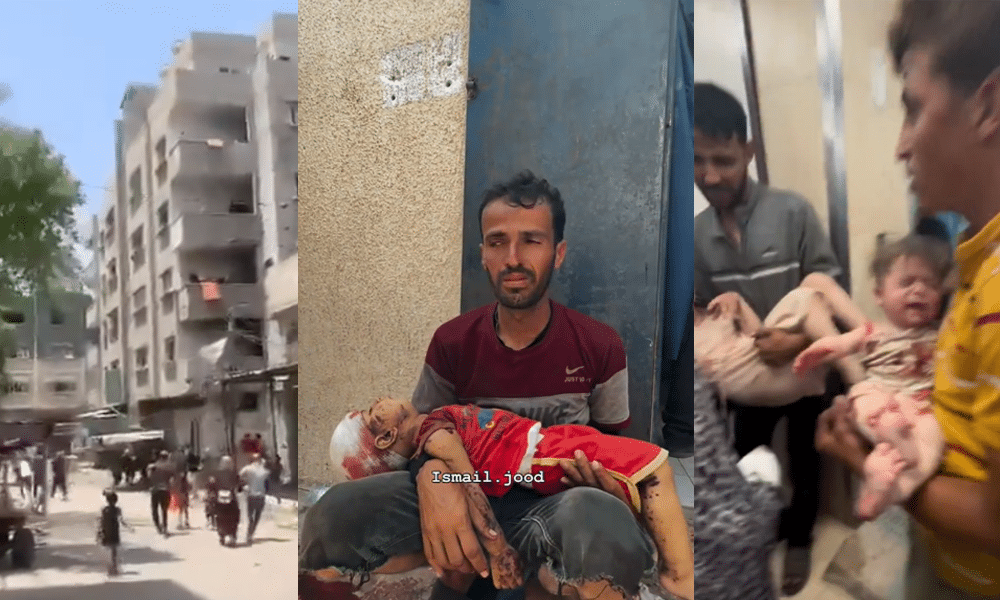Gaza’s Government Media Office has reported a devastating outcome following what it describes as an “Israeli massacre” at the Nuseirat refugee camp in central Gaza. The attack resulted in the deaths of 210 Palestinians and left more than 400 wounded.
This incident occurred after a special operation by the Israel Defense Forces (IDF) freed four Israeli hostages from the camp on Saturday.
Doctors Without Borders (MSF) has described the situation at Al-Aqsa Hospital in central Gaza to Aljazeera as a “nightmare.” The hospital, along with Nasser Hospital, is overwhelmed with severely injured patients, many of whom are women and children. The influx of casualties has strained the capacity of these medical facilities following the Israeli assault on Nuseirat.
Video footage shared on social media depicted dozens of bodies of men, women, and children lying in the streets of the Nuseirat area. The footage also showed bloodied and injured civilians, including many children and babies, being rushed to Al-Aqsa Martyrs Hospital in Deir al-Balah.
BREAKING: Dozens of casualties arrive nonstop at Al-Aqsa Martyrs Hospital in Deir el-Balah following the Israeli massacre in neighboring Nusseirat refugee camp. pic.twitter.com/jvadijdgwm
— Quds News Network (@QudsNen) June 8, 2024
Just after midday local time, Israeli army spokesperson Avichay Adraee announced that Israeli forces had launched an attack on the Nuseirat refugee camp “within the last hour.” Adraee later detailed that Israeli forces targeted two buildings “in the depths of Nuseirat” in broad daylight, rescuing four captives in the process.
Ken Roth, the former head of Human Rights Watch, told Al Jazeera that operating during the day posed significant risks to civilians. He noted that some bombs fell either on or adjacent to a market in al-Nuseirat, which was filled with people at the time.
Zaid, a paramedic from Nuseirat, informed Reuters that “Israeli drones and warplanes fired all night randomly at people’s houses and at people who tried to flee the area” before the Saturday attack.
The attack followed days of intensified Israeli strikes on Nuseirat and other neighbouring refugee camps in central Gaza. Earlier this week, local officials reported that at least 40 people were killed in an Israeli strike on a UN-run school where thousands of displaced Palestinians had sought shelter in the early hours of Thursday morning.
Francesca Albanese, the UN’s special rapporteur on the human rights situation in the occupied Palestinian territory, commented on the incident via social media.
She expressed relief for the release of the four Israeli captives but criticized the loss of hundreds of Palestinian lives, including women and children, as a consequence.
Albanese asserted that Israel could have secured the release of all hostages months ago through earlier ceasefire and hostage exchange proposals, which Israel reportedly refused.
She accused Israel of using hostages to legitimize actions that resulted in significant harm to Palestinians in Gaza, describing the actions as having a “genocidal intent.”
Relieved that four hostages have been released. It should not have come at the expense of at least 200 Palestinians, including children, killed and over 400 injured by Israel and allegedly foreign soldiers, while perfidiously hiding in an aid truck.
This is “humanitarian…— Francesca Albanese, UN Special Rapporteur oPt (@FranceskAlbs) June 8, 2024
As of April, approximately 9,500 Palestinians from Gaza and the West Bank were in Israeli captivity, according to estimates from the Addameer Prisoner Support and Human Rights Association. Among them, around 3,660 Palestinians are under administrative detention, a status involving imprisonment without charge or trial.
International humanitarian law states that no person may be punished for acts they did not commit, prohibiting collective punishment of a group for an individual’s crime.
Collective punishment targets individuals not responsible for the acts, violating the principle of individual responsibility, and often involves those with no direct association with the perpetrator.
In light of these principles, the International Criminal Court (ICC) is seeking arrest warrants for several key figures, including Hamas leader Yahya Sinwar and Israeli Prime Minister Benjamin Netanyahu, citing war crimes and crimes against humanity related to the 7 October attacks on Israel and the subsequent conflict in Gaza.


